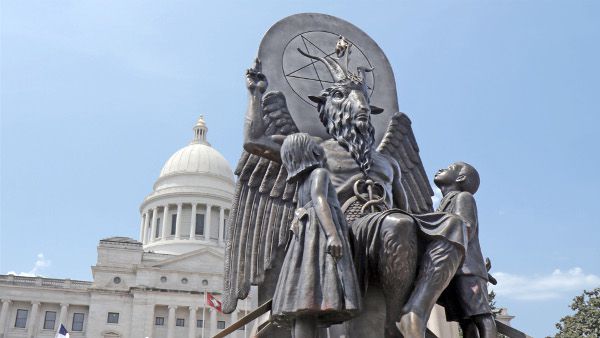Eye For Film >> Movies >> Hail Satan? (2019) Film Review
Hail Satan?
Reviewed by: Jennie Kermode

Though billed as the greatest story ever told, the Bible isn't all that hot when it comes to character development. This is notably the case with Satan - though he's presented as the ultimate villain, so little is said about him that most of our cultural beliefs about him actually come from the work of John Milton. This has led to a divergence in notions of what he represents. To traditional Christians, he is evil incarnate and Satanism seems bound to be a celebration of evil. To Satanists themselves, he is symbolic of resistance to power, cast out of Heaven because of his rebellion. Their belief system - which doesn't usually involve any serious mystical or supernatural elements - centres on the importance of thinking for oneself and seeking to control one's own destiny.
The Satanic Temple was formed 2013 but draws on a modern movement with its roots in the 1960s. In an US culture with increasingly theocratic tendencies, it has made it its mission to challenge and satirise, to provide a provocative opposition to Christian hegemony. Its success, however, is in large part down to an awareness that most people have no interest in processing these philosophical arguments. Informed by this perspective, it has developed pictures that might, depending on one's own viewpoint, be described as playful or as shock and awe. Perhaps its most famous campaign to date involved a scheme to erect a giant statue of Baphomet outside the Oklahoma State Capitol when an evangelist politician insisted on displaying the Ten Commandments there, arguing that the US is constitutionally secular and pluralist so if the one is allowed, the other should be too. This provides one of the hooks for Penny Lane's documentary, which explores the history of the organisation, its aims, its methods and the people behind it.

It's not difficult to create something entertaining from a subject like this. Indeed, Lane hardly needs to try when she's presented with what is essentially a series of ready-made performance art pieces. Things get interesting where she goes beyond this, teasing out the small hypocrisies and uncertainties of her interview subjects and pointing up the areas where they have plainly overreached themselves. This never comes across as snide because overall she portrays them in a likeable way and reveals the humour that informs much of their work. As we see them in action picking up litter and supporting homeless people whilst the leaders of megachurches rail against assorted minorities, it's hard not feel that the world has been inverted. This is counterpointed by scenes in which they're clearly being sacrilegious just for the sake of it, but this kind of petty childishness seems a small sin in the grand scheme of things.
Where the Satanic ethos wears thin is where it aligns itself with a sort of libertarianism so focused on its own purity that it overlooks the unevenness in the society it seeks to inform. The latter part of the film deals with a split in the movement occasioned by one member's suggestion that Donald Trump should be assassinated. This triggers panic at the top. It's unprofessional, potentially dangerous and damaging to the organisation's reputation. She has to go. From her point of view, however, the rebel (not unironically finding herself in the more Satan-like role) is taking a radical stance entirely justified by the way the Trump regime's policies are affecting people's lives.
As a woman, she has a different relationship with the regime's policies and can't shield herself from the world in the same way as her (white and able bodied) male counterparts. This raises interesting questions. What is their personal relationship to what they do? Are they taking any political risks? Are they really standing up for the vulnerable, or are they people with comparatively easy lives just playing a game?
The commitment of some is plain to see. Their primary public spokesperson, Lucien Greaves, persists with public speaking engagements even when he's threatened with assassination. Lane doesn't reserve much sympathy for those who respond to the organisation in this way, though they are positioned as scared, much of the time, rather than simply malicious. There is reference to the Satanic Panics of the Eighties. Lane doesn't bother to rehash an area that has been amply detailed in other films, but does illustrate some of the ways in which it has filtered through to the present day. This material is so much more outrageous than anything the Satanists do that the only way it can really be balanced is by keeping it to a minimum. This might frustrate viewers who were drawn to the the film in the hope of watching something scandalous but it's the only way to keep Satanism centre frame.
At times this documentary risks becoming too obvious; at others, Lane's sharp eye for the mistakes people make in assuming things to be obvious is what makes it work. If you're already familiar with the Satanic Temple you won't find a great deal that's new but you'll probably still be entertained. For those new to the subject, it will provide a fascinating - but never hagiographic - introduction.
Reviewed on: 14 Apr 2019


















